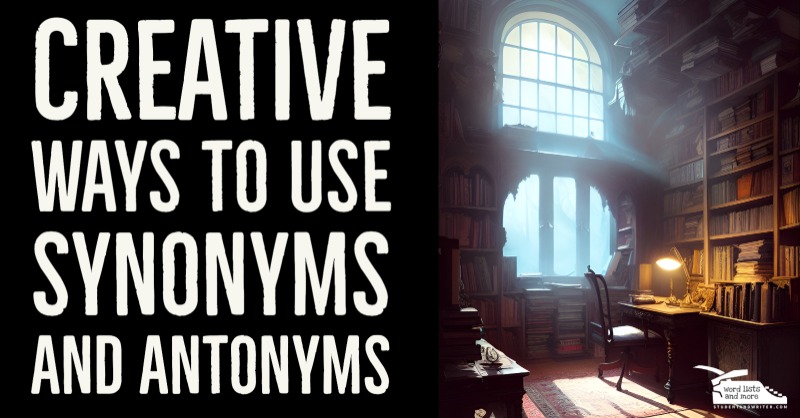The Importance of Word Choice in Writing
Word choice plays a vital role in writing, whether it’s fiction, non-fiction, or academic writing. It’s not just about using sophisticated words to impress your readers, but it’s about conveying your ideas in a clear and concise way. You need to choose the right words to create an impact on your readers and make them remember your content.
Your word choices can affect the tone and mood of your writing. For instance, using positive words can create an upbeat mood, whereas negative words can create a gloomy tone. The words you choose can also impact the pace and rhythm of your writing, and even the reader’s perception of your message.
Writing with variety is key to crafting a captivating story. Using synonyms is an easy way to make your language more interesting and engaging. Instead of using the same word multiple times, consider alternatives like “exclaimed,” “responded,” and “declared” to create a more dynamic dialogue and description. Experiment with different words to keep your readers engaged and create an atmosphere of suspense or surprise. I have an entire blog post dedicated to other ways to say “said” here.
How to Use Synonyms to Improve Your Writing
Synonyms are words that have similar meanings to a particular word. Using synonyms in your writing can help you avoid repetition, which can make your writing sound monotonous. Here are some benefits of using synonyms in your writing.
Benefits of Using Synonyms
- Avoid repetition: Using synonyms can help you avoid repeating the same word multiple times in your content.
- Enhance clarity: Synonyms can improve the clarity of your writing by providing alternate words that better fit the context.
- Add variety: Synonyms can add variety to your content and make it more interesting to read.
Tips for Finding the Right Synonym
- Use a Thesaurus: A thesaurus is a useful tool for finding synonyms. It can help you find alternate words with similar meanings to the word you’re using.
- Understand the Context: Make sure you choose the right synonym that fits the context of your writing. Not all synonyms are interchangeable, and using the wrong one can lead to confusion.
- Consider the Tone: Choose a synonym that fits the tone and mood of your writing. Using the wrong word can change the tone and impact of your message.
How to Use Antonyms to Add Depth to Your Writing
Antonyms are words that have opposite meanings to a particular word. Using antonyms in your writing can add depth to your content and create contrast. Here are some benefits of using antonyms in your writing.
Benefits of Using Antonyms
- Create Contrast: Antonyms can create contrast in your writing, which can make your message more impactful.
- Add Depth: Using antonyms can add depth to your content and help you communicate your ideas more effectively.
- Improve Clarity: Antonyms can help you clarify your message by providing a word that has an opposite meaning to the word you’re using.
Tips for Finding the Right Antonym
- Use a Thesaurus: A thesaurus can also help you find antonyms. Look for words with opposite meanings to the word you’re using.
- Consider the Tone: Choose an antonym that fits the tone and mood of your writing. Using the wrong word can change the tone and impact of your message.
- Understand the Context: Make sure the antonym you choose fits the context of your writing. Using the wrong word can lead to confusion.
Common Mistakes to Avoid when Using Synonyms and Antonyms
Using synonyms and antonyms can enhance your writing, but it’s essential to avoid common mistakes. Here are some mistakes to watch out for.
- Overusing Synonyms: Using too many synonyms can make your writing sound forced and unnatural. Use them sparingly.
- Using the Wrong Synonym or Antonym: Choosing the wrong word can change the meaning of your message or make it confusing.
- Choosing Words for No Reason: Don’t use synonyms or antonyms just for the sake of it. Make sure they add value to your content.
Examples of Effective Word Choice in Literature
Effective word choice is essential in literature, and there are many examples of writers who have used it to great effect. For instance, in “To Kill a Mockingbird,” Harper Lee uses specific words to convey the themes of racism and injustice. She uses words like “nigger-lover” and “white trash” to show the bigotry and prejudice in society.
Another example is in F. Scott Fitzgerald’s “The Great Gatsby.” He uses words like “green light,” “valley of ashes,” and “old sport” to create an immersive and vivid world for readers. Effective word choice can transport readers to a different world and make them feel like they’re part of the story.
Exercises to Improve Your Word Choice Skills
Here are some exercises you can do to improve your word choice skills:
- Rewrite a passage using synonyms: Choose a passage from a book or article and rewrite it using synonyms. This exercise can help you expand your vocabulary and improve your writing skills.
- Use a Thesaurus for Practice: Choose a word and find as many synonyms and antonyms as possible. This exercise can help you become more familiar with different words and their meanings.
- Write a Story Using Specific Words: Choose a set of words and write a story using them. This exercise can help you become more creative and think outside the box.
Tools and Resources for Finding Synonyms and Antonyms
There are many tools and resources available to help you find synonyms and antonyms. Here are some of the best ones:
- Thesaurus.com: Thesaurus.com is a free online tool that provides synonyms and antonyms for any word you enter.
- Power Thesaurus: Power Thesaurus is a crowdsourced online thesaurus that provides synonyms and antonyms for any word you enter.
- Merriam-Webster Thesaurus: Merriam-Webster Thesaurus is a comprehensive online thesaurus that provides synonyms and antonyms for any word you enter.
The Impact of Word Choice on Reader Perception
Word choice can significantly impact how readers perceive your content. For instance, using positive words can make readers feel hopeful and optimistic, whereas negative words can make them feel gloomy and pessimistic. Using the right words can help you create the desired impact on your readers.
How to Use Word Choices to Convey Tone and Mood
Word choices can significantly impact the tone and mood of your writing. Use antonyms to create powerful contrasts in your writing. By pairing words like “light” and “dark,” writers can create vivid imagery that captures the attention of readers and evokes strong emotions. This can help writers create memorable characters and gripping plots.
Here are some tips for using word choices to convey tone and mood:
- Use Positive Words for an Upbeat Tone: Using positive words can create an upbeat and optimistic tone in your writing.
- Use Negative Words for a Gloomy Tone: Using negative words can create a gloomy and pessimistic tone in your writing.
- Use Strong Verbs for an Assertive Tone: Using strong verbs can create an assertive and confident tone in your writing.
Unleashing the Power of Synonyms and Antonyms for Exceptional Writing
It’s important to understand the significance of using the right words to convey an idea. Word choice is a critical aspect of writing, and it can make or break the impact of your content. You must choose your words carefully to communicate your message effectively.
Incorporate synonyms and antonyms into dialogue to give your characters distinct voices and personalities. Writing lively dialogue with distinct voices and personalities can be tricky. By incorporating synonyms and antonyms into dialogue, authors can give their characters a unique linguistic style that sets them apart from one another. Using different words for the same object or concept allows readers to better understand and appreciate the nuances of each character’s voice, ultimately bringing them to life on the page.



